| Listing 1 - 8 of 8 |
Sort by
|
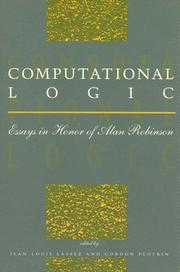
ISBN: 0262121565 9780262121569 Year: 1991 Publisher: Cambridge, Mass.: MIT Press,
Abstract | Keywords | Export | Availability | Bookmark
 Loading...
Loading...Choose an application
- Reference Manager
- EndNote
- RefWorks (Direct export to RefWorks)
Automatic theorem proving --- Logic programming --- Logisch programmeren --- Logische programmering --- Programmation logique --- Programmeren [Logisch ] --- Programming [Logic ] --- Theorema's--Automatische bewijsvoering --- Théorèmes--Démonstration automatique --- Robinson, John Alan --- Automatic theorem proving. --- Logic programming. --- Robinson, J. A. (John Alan)
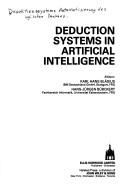
ISBN: 0745804098 047021550X 9780745804095 9780470215500 Year: 1989 Volume: vol *28 Publisher: Chichester: Ellis Horwood,
Abstract | Keywords | Export | Availability | Bookmark
 Loading...
Loading...Choose an application
- Reference Manager
- EndNote
- RefWorks (Direct export to RefWorks)
AI(Artificial intelligence) --- Artificial intelligence --- Artificial thinking --- Artificiële intelligentie --- Automatic theorem proving --- Electronic brains --- Intellectronics --- Intelligence [Artificial ] --- Intelligence artificielle --- Intelligent machines --- Kunstmatige intelligentie --- Machine intelligence --- Theorema's--Automatische bewijsvoering --- Thinking [Artificial ] --- Théorèmes--Démonstration automatique --- Cerveaux électroniques --- Machines intelligentes --- Pensée artificielle --- Automatic theorem proving. --- Artificial intelligence. --- Unification --- Resolution --- Graph --- Prolog (langage de programmation) --- Induction --- Gentzen Calculus --- Logic
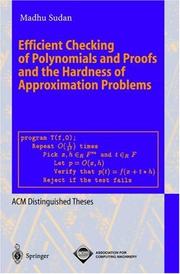
ISBN: 3540606157 0387606157 354048485X Year: 1996 Volume: 1001 Publisher: Berlin ; Heidelberg ; New York Springer Verlag
Abstract | Keywords | Export | Availability | Bookmark
 Loading...
Loading...Choose an application
- Reference Manager
- EndNote
- RefWorks (Direct export to RefWorks)
This book is based on the author's PhD thesis which was selected as the winning thesis of the 1993 ACM Doctoral Dissertation Competition. The author improved the presentation and included the progress achieved since the thesis was approved by the University of California at Berkeley. This work is a fascinating piece of theoretical computer science research building on deep results from different areas. It provides new theoretical insights and advances applicable techniques in such different areas as computational complexity, efficient (randomized) checking of proofs, programs and polynomials, approximation algorithms, NP-complete optimization, and error-detection and error-correction algorithms in coding theory.
Automatic theorem proving --- Berekeningen [Ingewikkeldheid van ] --- Calcul [Complexité de ] --- Complexité de calcul --- Computational complexity --- Ingewikkeldheid van berekeningen --- NP-complete problems --- Theorema's--Automatische bewijsvoering --- Théorèmes--Démonstration automatique --- Computer software. --- Logic design. --- Software engineering. --- Computer science. --- Coding theory. --- Numerical analysis. --- Algorithm Analysis and Problem Complexity. --- Logics and Meanings of Programs. --- Software Engineering. --- Mathematical Logic and Formal Languages. --- Coding and Information Theory. --- Numerical Analysis. --- Software, Computer --- Computer systems --- Mathematical analysis --- Data compression (Telecommunication) --- Digital electronics --- Information theory --- Machine theory --- Signal theory (Telecommunication) --- Computer programming --- Informatics --- Science --- Computer software engineering --- Engineering --- Design, Logic --- Design of logic systems --- Electronic circuit design --- Logic circuits --- Switching theory
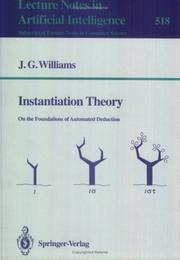
ISBN: 3540543333 0387543333 3540475613 Year: 1991 Volume: vol 518 vol *49 Publisher: Berlin New York Springer-Verlag
Abstract | Keywords | Export | Availability | Bookmark
 Loading...
Loading...Choose an application
- Reference Manager
- EndNote
- RefWorks (Direct export to RefWorks)
Instantiation Theory presents a new, general unification algorithm that is of immediate use in building theorem provers and logic programming systems. Instantiation theory is the study of instantiation in an abstract context that is applicable to most commonly studied logical formalisms. The volume begins with a survey of general approaches to the study of instantiation, as found in tree systems, order-sorted algebras, algebraic theories, composita, and instantiation systems. A classification of instantiation systems is given, based on properties of substitutions, degree of type strictness, and well-foundedness of terms. Equational theories and the use of typed variables are studied in terms of quotient homomorphisms and embeddings, respectively. Every instantiation system is a quotient system of a subsystem of first-order term instantiation. The general unification algorithm is developed as an application of the basic theory. Its soundness is rigorously proved, and its completeness and efficiency are verfied for certain classes of instantiation systems. Appropriate applications of the algorithm include unification of first-order terms, order-sorted terms, and first-order formulas modulo alpha-conversion, as well as equational unification using simple congruences.
Automatic theorem proving --- Theorema's--Automatische bewijsvoering --- Théorèmes--Démonstration automatique --- 681.3*I23 --- Automated theorem proving --- Theorem proving, Automated --- Theorem proving, Automatic --- Artificial intelligence --- Proof theory --- Deduction and theorem proving: answer/reason extraction; reasoning; resolution; metatheory; mathematical induction; logic programming (Artificial intelligence) --- Automatic theorem proving. --- 681.3*I23 Deduction and theorem proving: answer/reason extraction; reasoning; resolution; metatheory; mathematical induction; logic programming (Artificial intelligence) --- Artificial intelligence. --- Information theory. --- Software engineering. --- Computer science. --- Algebra --- Computer software. --- Artificial Intelligence. --- Theory of Computation. --- Software Engineering/Programming and Operating Systems. --- Mathematical Logic and Formal Languages. --- Symbolic and Algebraic Manipulation. --- Algorithm Analysis and Problem Complexity. --- Data processing. --- Software, Computer --- Computer systems --- Informatics --- Science --- Computer software engineering --- Engineering --- Communication theory --- Communication --- Cybernetics --- AI (Artificial intelligence) --- Artificial thinking --- Electronic brains --- Intellectronics --- Intelligence, Artificial --- Intelligent machines --- Machine intelligence --- Thinking, Artificial --- Bionics --- Cognitive science --- Digital computer simulation --- Electronic data processing --- Logic machines --- Machine theory --- Self-organizing systems --- Simulation methods --- Fifth generation computers --- Neural computers
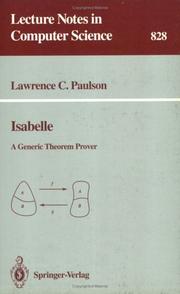
ISBN: 3540582444 0387582444 3540485864 Year: 1994 Volume: 828 Publisher: Berlin ; New York ; Tokyo Springer-Verlag
Abstract | Keywords | Export | Availability | Bookmark
 Loading...
Loading...Choose an application
- Reference Manager
- EndNote
- RefWorks (Direct export to RefWorks)
As a generic theorem prover, Isabelle supports a variety of logics. Distinctive features include Isabelle's representation of logics within a meta-logic and the use of higher-order unification to combine inference rules. Isabelle can be applied to reasoning in pure mathematics or verification of computer systems. This volume constitutes the Isabelle documentation. It begins by outlining theoretical aspects and then demonstrates the use in practice. Virtually all Isabelle functions are described, with advice on correct usage and numerous examples. Isabelle's built-in logics are also described in detail. There is a comprehensive bebliography and index. The book addresses prospective users of Isabelle as well as researchers in logic and automated reasoning.
Automatic theorem proving --- Theorema's--Automatische bewijsvoering --- Théorèmes--Démonstration automatique --- Automatic theorem proving. --- Théorèmes --- Démonstration automatique --- Isabelle (Computer file) --- Isabelle (Computer file). --- Théorèmes --- Démonstration automatique --- Computer science. --- Logic design. --- Software engineering. --- Artificial intelligence. --- Logic, Symbolic and mathematical. --- Mathematical Logic and Formal Languages. --- Logics and Meanings of Programs. --- Software Engineering. --- Artificial Intelligence. --- Mathematical Logic and Foundations. --- Informatics --- Science --- AI (Artificial intelligence) --- Artificial thinking --- Electronic brains --- Intellectronics --- Intelligence, Artificial --- Intelligent machines --- Machine intelligence --- Thinking, Artificial --- Bionics --- Cognitive science --- Digital computer simulation --- Electronic data processing --- Logic machines --- Machine theory --- Self-organizing systems --- Simulation methods --- Fifth generation computers --- Neural computers --- Computer software engineering --- Engineering --- Design, Logic --- Design of logic systems --- Digital electronics --- Electronic circuit design --- Logic circuits --- Switching theory --- Algebra of logic --- Logic, Universal --- Mathematical logic --- Symbolic and mathematical logic --- Symbolic logic --- Mathematics --- Algebra, Abstract --- Metamathematics --- Set theory --- Syllogism
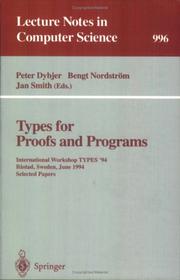
ISBN: 3540605797 0387605797 3540477705 Year: 1995 Volume: 996 Publisher: Berlin ; Heidelberg ; New York Springer
Abstract | Keywords | Export | Availability | Bookmark
 Loading...
Loading...Choose an application
- Reference Manager
- EndNote
- RefWorks (Direct export to RefWorks)
This book presents a strictly refereed collection of revised full papers selected from the papers accepted for the TYPES '94 Workshop, held under the auspices of the ESPRIT Basic Research Action 6453 Types for Proofs and Programs in Bastad, Sweden, in June 1994. The 10 papers included address various aspects of developing computer-assisted proofs and programs using a logical framework. Type theory and three logical frameworks based on it are dealt with: ALF, Coq, and LEGO; other topics covered are metatheory, the Isabelle system, 2-calculus, proof checkers, and ZF set theory.
Automatic theorem proving --- Theorema's--Automatische bewijsvoering --- Théorèmes--Démonstration automatique --- Théorèmes --- Congresses. --- Démonstration automatique --- Congrès --- Théorèmes --- Démonstration automatique --- Congrès --- Software engineering. --- Computer science. --- Logic design. --- Artificial intelligence. --- Logic, Symbolic and mathematical. --- Software Engineering/Programming and Operating Systems. --- Mathematical Logic and Formal Languages. --- Logics and Meanings of Programs. --- Programming Languages, Compilers, Interpreters. --- Artificial Intelligence. --- Mathematical Logic and Foundations. --- Algebra of logic --- Logic, Universal --- Mathematical logic --- Symbolic and mathematical logic --- Symbolic logic --- Mathematics --- Algebra, Abstract --- Metamathematics --- Set theory --- Syllogism --- AI (Artificial intelligence) --- Artificial thinking --- Electronic brains --- Intellectronics --- Intelligence, Artificial --- Intelligent machines --- Machine intelligence --- Thinking, Artificial --- Bionics --- Cognitive science --- Digital computer simulation --- Electronic data processing --- Logic machines --- Machine theory --- Self-organizing systems --- Simulation methods --- Fifth generation computers --- Neural computers --- Design, Logic --- Design of logic systems --- Digital electronics --- Electronic circuit design --- Logic circuits --- Switching theory --- Informatics --- Science --- Computer software engineering --- Engineering
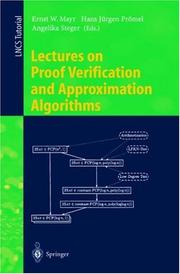
ISSN: 03029743 ISBN: 3540642013 9783540642015 3540697012 Year: 1998 Volume: 1367 Publisher: Berlin: Springer,
Abstract | Keywords | Export | Availability | Bookmark
 Loading...
Loading...Choose an application
- Reference Manager
- EndNote
- RefWorks (Direct export to RefWorks)
During the last few years, we have seen quite spectacular progress in the area of approximation algorithms: for several fundamental optimization problems we now actually know matching upper and lower bounds for their approximability. This textbook-like tutorial is a coherent and essentially self-contained presentation of the enormous recent progress facilitated by the interplay between the theory of probabilistically checkable proofs and aproximation algorithms. The basic concepts, methods, and results are presented in a unified way to provide a smooth introduction for newcomers. These lectures are particularly useful for advanced courses or reading groups on the topic.
Algorithmes (Ordinateur) --- Algoritmen (Computer) --- Approximatietheorie --- Approximation theory --- Automatic theorem proving --- Computer algorithms --- Theorema's--Automatische bewijsvoering --- Théorie des approximations --- Théorèmes--Démonstration automatique --- Computer Science --- Engineering & Applied Sciences --- Theory of approximation --- Automated theorem proving --- Theorem proving, Automated --- Theorem proving, Automatic --- Computer science. --- Computers. --- Algorithms. --- Computer science --- Calculus of variations. --- Combinatorics. --- Computer Science. --- Theory of Computation. --- Algorithm Analysis and Problem Complexity. --- Discrete Mathematics in Computer Science. --- Computation by Abstract Devices. --- Calculus of Variations and Optimal Control; Optimization. --- Mathematics. --- Information theory. --- Computer software. --- Computational complexity. --- Mathematical optimization. --- Optimization (Mathematics) --- Optimization techniques --- Optimization theory --- Systems optimization --- Mathematical analysis --- Maxima and minima --- Operations research --- Simulation methods --- System analysis --- Complexity, Computational --- Electronic data processing --- Machine theory --- Software, Computer --- Computer systems --- Communication theory --- Communication --- Cybernetics --- Combinatorics --- Algebra --- Informatics --- Science --- Computer science—Mathematics. --- Isoperimetrical problems --- Variations, Calculus of --- Algorism --- Arithmetic --- Automatic computers --- Automatic data processors --- Computer hardware --- Computing machines (Computers) --- Electronic brains --- Electronic calculating-machines --- Electronic computers --- Hardware, Computer --- Calculators --- Cyberspace --- Foundations
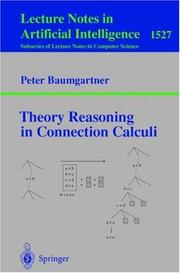
ISBN: 3540492100 3540655093 Year: 1998 Volume: 1527 *224 Publisher: Berlin ; Heidelberg ; New York Springer Verlag
Abstract | Keywords | Export | Availability | Bookmark
 Loading...
Loading...Choose an application
- Reference Manager
- EndNote
- RefWorks (Direct export to RefWorks)
The ability to draw inferences is a central operation in any artificial intelligence system. Automated reasoning is therefore among the traditional disciplines in AI. Theory reasoning is about techniques for combining automated reasoning systems with specialized and efficient modules for handling domain knowledge called background reasoners. Connection methods have proved to be a good choice for implementing high-speed automated reasoning systems. They are the starting point in this monograph,in which several theory reasoning versions are defined and related to each other. A major contribution of the book is a new technique of linear completion allowing for the automatic construction of background reasoners from a wide range of axiomatically given theories. The emphasis is on theoretical investigations, but implementation techniques based on Prolog are also covered.
Automatic theorem proving --- Computer Science --- Engineering & Applied Sciences --- Automatic theorem proving. --- Theorema's--Automatische bewijsvoering --- Théorèmes--Démonstration automatique --- Automated theorem proving --- Theorem proving, Automated --- Theorem proving, Automatic --- Engineering. --- Computers. --- Mathematical logic. --- Artificial intelligence. --- Robotics. --- Automation. --- Robotics and Automation. --- Theory of Computation. --- Artificial Intelligence (incl. Robotics). --- Mathematical Logic and Formal Languages. --- Mathematical Logic and Foundations. --- Artificial intelligence --- Proof theory --- Information theory. --- Computer science. --- Logic, Symbolic and mathematical. --- Artificial Intelligence. --- Algebra of logic --- Logic, Universal --- Mathematical logic --- Symbolic and mathematical logic --- Symbolic logic --- Mathematics --- Algebra, Abstract --- Metamathematics --- Set theory --- Syllogism --- Informatics --- Science --- AI (Artificial intelligence) --- Artificial thinking --- Electronic brains --- Intellectronics --- Intelligence, Artificial --- Intelligent machines --- Machine intelligence --- Thinking, Artificial --- Bionics --- Cognitive science --- Digital computer simulation --- Electronic data processing --- Logic machines --- Machine theory --- Self-organizing systems --- Simulation methods --- Fifth generation computers --- Neural computers --- Communication theory --- Communication --- Cybernetics --- Automatic computers --- Automatic data processors --- Computer hardware --- Computing machines (Computers) --- Electronic calculating-machines --- Electronic computers --- Hardware, Computer --- Computer systems --- Calculators --- Cyberspace --- Automatic factories --- Automatic production --- Computer control --- Engineering cybernetics --- Factories --- Industrial engineering --- Mechanization --- Assembly-line methods --- Automatic control --- Automatic machinery --- CAD/CAM systems --- Robotics --- Automation
| Listing 1 - 8 of 8 |
Sort by
|

 Search
Search Feedback
Feedback About UniCat
About UniCat  Help
Help News
News